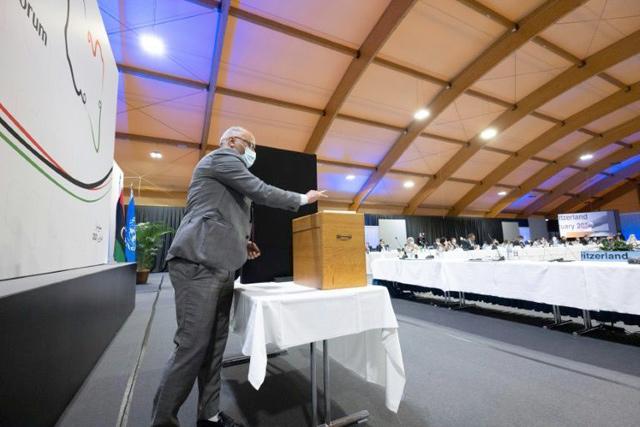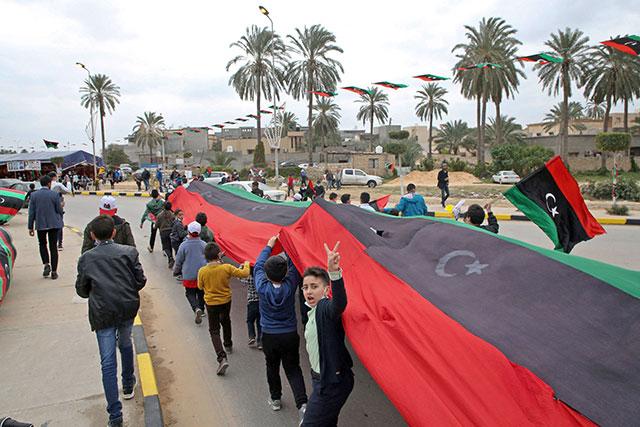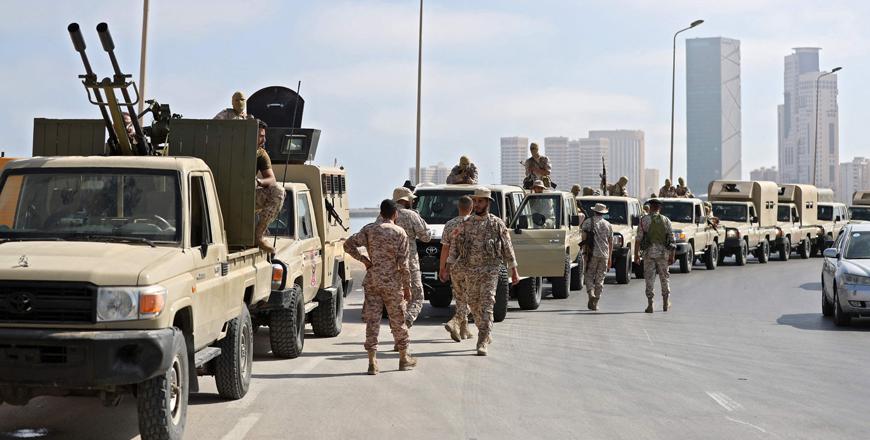You are here
Libyans select surprise candidate for interim prime minister
By AFP - Feb 07,2021 - Last updated at Feb 07,2021

This handout photo taken by the UN shows a delegate casting his vote for the new interim government on Friday (AFP photo)
GENEVA — Libyan delegates at UN-led talks outside Geneva on Friday made the surprise choice of Abdul Hamid Dbeibah as prime minister of a transitional unity government to take the war-ravaged country through to elections in December.
He was chosen along with a three-member presidency council to head a unity administration and steer the North African state towards the ballot box on December 24.
Dbeibah, a Canadian-trained engineer from the city of Misrata and founder of the Libya Al Mostakbal (Libya of the Future) movement, previously led the Libyan Investment and Development Company under dictator Muammar Qadhafi.
The vote is part of a complex UN-led process aiming to build on a fragile ceasefire and end more than a decade of conflict.
Oil-rich Libya has been torn by civil war since a NATO-backed uprising led to the toppling and killing of Qadhafi in 2011.
Acting UN envoy Stephanie Williams, who facilitated the week-long talks outside Geneva, called it a “historic moment”.
“The importance of the decision that you have taken here today will grow with the passage of time in the collective memory of the Libyan people,” she said after the vote.
Washington welcomed the interim officials.
“We fully support the outcome of the UN-facilitated process that will lead to a stable, secure Libya and elections in December,” US State Department spokesman Ned Price said.
Moscow, which has played a key role in Libya, wished the new leaders well.
“We hope the new Libyan authorities successfully solve all the difficult tasks of the transition period,” Russia’s foreign ministry said in a statement.
39-34 victory
Libya has been split between a Government of National Accord (GNA) in Tripoli, and the eastern-based House of Representatives, backed by military leader Khalifa Haftar.
In 2019, Haftar launched a months-long campaign to seize Tripoli from pro-GNA forces, but was pushed back eastwards last year, leading to an October ceasefire and renewed political efforts for a more permanent peace.
On Friday the Libyan Political Dialogue Forum, comprised of 75 participants selected by the UN to represent a broad cross-section of society, chose between proposed line-ups for the four leadership positions: Prime minister and three presidency council members, each representing one of Libya’s three main regions.
East Libyan diplomat Mohammad Younes Menfi, a former ambassador expelled from Greece in December 2019 as Athens protested against an agreement struck between the GNA and Turkey, will head the council.
His deputies will be Moussa Al Koni, a Touareg from Libya’s south, and Abdallah Hussein Al Lafi, from the western city of Zuwara.
And in the final run-off, Dbeibah’s list beat that of Fathi Bashagha, the GNA’s powerful interior minister, by 39 votes to 34.
Bashagha congratulated the winning list, saying the vote had “embodied democracy in its clearest form”, while GNA head Fayez Al Sarraj wished them “success in their mission”.
Key powerbroker Aguila Saleh, the speaker of the Haftar-allied parliament based in the eastern city of Tobruk, was not elected to the transitional council.
Saleh on Friday said he “welcomes the victory of the Libyan people” with the formation of the new government.
Analyst Wolfram Lacher, from the German Institute for International and Security Affairs (SWP), warned that Dbeibah was a “controversial figure” and that “if this government becomes operational at all, its reach is likely to remain very limited”.
“The new executive will have very little traction, if at all, in the east,” he said.
Roadmap to elections
Even if the appointments are a step forward in the political process, the new executive will quickly have to assert its legitimacy among myriad local political actors, some of whom have already distanced themselves from the Geneva talks.
It will also face the fact that multiple foreign forces still have a presence on Libyan soil.
The UN says the transitional council will be tasked with “reuniting state institutions and ensuring security” until the elections.
The fragile October ceasefire agreed in Geneva has largely held, despite threats by Haftar to resume fighting.
The UN Security Council on Thursday instructed Secretary General Antonio Guterres to deploy ceasefire monitors to Libya.
Haftar has received backing from the United Arab Emirates, Egypt and Russia, which has reportedly deployed mercenaries from a private group with links to Russian President Vladimir Putin.
The GNA is supported by Turkey, which has provided crucial firepower and sent Syrian rebels to fight Haftar’s forces.
Turkey said “the opportunity” provided by the decision would help ensure “the territorial integrity and the political unity” of Libya, while Egypt said it “looks forward” to working with the new officials.
Related Articles
TRIPOLI — The powerful interior minister of Libya’s unity government survived an assassination attempt Sunday, an aide said, sparking fears
TRIPOLI — Libya's prime minister-designate Abdul Hamid Dbeibah is set to name a transitional government on Thursday tasked with unifying the
TRIPOLI — Gunfire rocked Libya's capital for several hours on Tuesday as a rival prime minister attempted to oust interim premier Abdulhamid


















